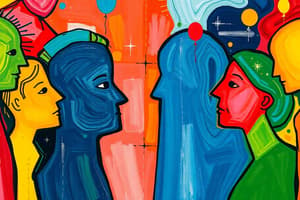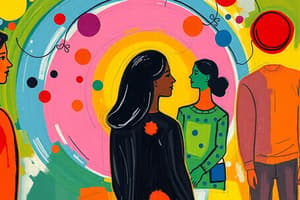Podcast
Questions and Answers
What is the primary focus of sociology as a discipline?
What is the primary focus of sociology as a discipline?
- Analyzing physical sciences
- Studying plant life
- Exploring astronomy
- Examining human behavior and interaction (correct)
Which field of study helps us understand the complex social systems that shape our lives?
Which field of study helps us understand the complex social systems that shape our lives?
- Botany
- Astronomy
- Chemistry
- Sociology (correct)
What is the process through which we learn norms, values, and behaviors in society called?
What is the process through which we learn norms, values, and behaviors in society called?
- Modernization
- Socialization (correct)
- Industrialization
- Fossilization
Which sociological perspective emphasizes the interdependence of social structures and their role in maintaining social order?
Which sociological perspective emphasizes the interdependence of social structures and their role in maintaining social order?
According to conflict theory, how is socialization viewed?
According to conflict theory, how is socialization viewed?
What is the main focus of Symbolic Interactionism?
What is the main focus of Symbolic Interactionism?
Which stage of life involves individuals developing stable social relationships and taking on various social roles?
Which stage of life involves individuals developing stable social relationships and taking on various social roles?
How does Feminist Theory differ from traditional sociological perspectives?
How does Feminist Theory differ from traditional sociological perspectives?
What do socialization processes help shape in individuals?
What do socialization processes help shape in individuals?
How does Sociology contribute to understanding society?
How does Sociology contribute to understanding society?
Flashcards are hidden until you start studying
Study Notes
Unraveling Social Complexities: Understanding Sociology
Sociology, sometimes referred to as the science of society, is a discipline that examines the intricate patterns of human behavior and interaction. This field of study is a powerful tool for understanding the world we live in, helping us make sense of the complex social systems that shape our lives.
Socialization and Socialization Processes
Socialization is the process through which we learn and develop norms, values, and behaviors that allow us to function effectively in our society. It starts from birth and continues throughout our lives as we interact with others, forming relationships, and participating in various social groups, such as families, friends, schools, and workplaces.
As we socialize, we internalize societal expectations and conventions, which enable us to interact with others and navigate our social environment.
Socialization Theory and Sociological Perspectives
Sociologists use different theories to help explain the socialization process and the various social systems and institutions that shape our lives.
-
Functionalism focuses on the interdependence of social structures and the ways in which they help maintain social order. This perspective emphasizes the positive aspects of socialization, highlighting how it contributes to social stability and integration.
-
Conflict Theory views socialization as a way of perpetuating social inequality. According to this perspective, socialization processes favor the dominant groups in society, resulting in the marginalization and exploitation of other groups.
-
Symbolic Interactionism is a micro-level perspective that focuses on the meanings people attach to social interactions. This perspective emphasizes the importance of language, symbols, and interaction in shaping our social experiences and social identities.
-
Feminist Theory challenges traditional sociological perspectives by highlighting the role of gender in socialization processes. This perspective emphasizes the importance of addressing gender inequality and promoting gender equity.
Socialization Across the Lifespan
Socialization is a lifelong process that occurs throughout various stages of our lives.
-
Early Childhood Socialization: During this period, children learn basic social skills, such as sharing and cooperation, from their parents and caregivers. They also begin to form peer relationships and develop a sense of self.
-
Adolescence and Young Adulthood: As teenagers enter the world of education and work, they develop new social identities and explore different social roles. This period is characterized by a search for identity and a desire for independence.
-
Adulthood: In adulthood, individuals develop stable social relationships and take on various social roles, such as parent, worker, and citizen. This period is characterized by the consolidation of social identities and the development of a mature sense of self.
The Power of Socialization and Sociology
Socialization has far-reaching consequences for our lives, shaping our identities, values, and behaviors. Understanding socialization processes and sociological perspectives can help us:
-
Promote social justice and equality: Sociology provides tools and insights that help us understand and challenge social inequalities.
-
Improve interpersonal relationships: By understanding socialization processes, we can improve our communication and interpersonal skills, leading to stronger, healthier relationships.
-
Increase cultural competence: Sociology can help us appreciate the diverse cultures and perspectives that exist in our society, fostering empathy and understanding.
-
Reduce social conflict: Sociology can help us understand the root causes of social conflict and develop strategies for resolving it.
As we explore the complexities of our society, we gain a deeper appreciation for the importance of socialization and other sociological perspectives. By understanding these concepts, we can better understand our world, improve our relationships, and promote social justice and equality.
Studying That Suits You
Use AI to generate personalized quizzes and flashcards to suit your learning preferences.



